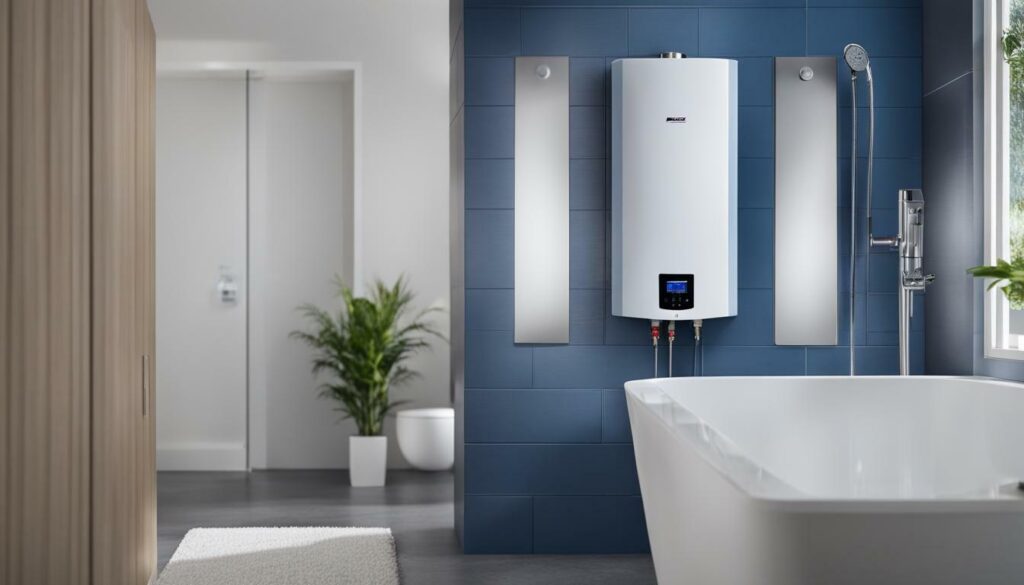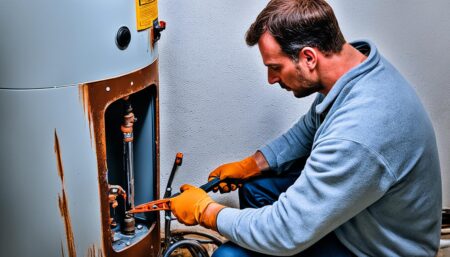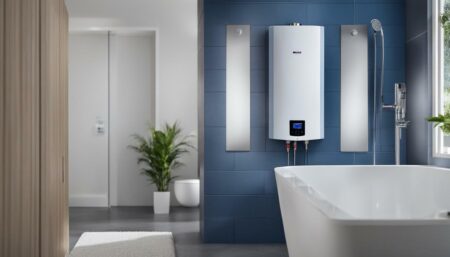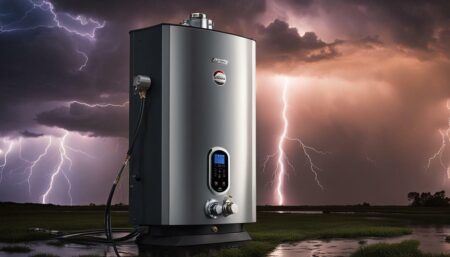Electric tankless water heaters may be the answer if you’re looking for a more energy-efficient and cost-effective solution to heat water in your home. In this guide, we’ll provide you with a comprehensive overview of the advantages and disadvantages of electric tankless water heaters to help you make an informed decision.
- Electric tankless water heaters provide an efficient and cost-effective way to heat water in your home.
- While they have many advantages, electric tankless water heaters may have certain limitations, such as upfront costs and potential flow rate limitations.
- It’s important to consider factors such as installation requirements, energy efficiency, and maintenance before making a decision about whether electric tankless water heaters are right for your household.
- Comparing electric tankless water heaters with traditional tank-based systems and solar water heaters can help you determine the best water heating option for your needs.
- By weighing the pros and cons discussed in this guide, you can make an informed decision about whether electric tankless water heaters are the right choice for your home’s hot water needs.
Understanding Electric Tankless Water Heaters
If you’re considering an electric tankless water heater, it’s important to understand how this technology works. Unlike traditional water heating systems that use a tank to store hot water, electric tankless water heaters heat water on-demand, delivering hot water instantly whenever you need it.
Electric tankless water heaters are powered by electricity, which heats the water as it passes through a heat exchanger. This process eliminates the need for a bulky water storage tank, making electric tankless water heaters space-efficient and ideal for homes with limited storage space.
One of the primary advantages of electric tankless water heaters is their energy efficiency. Because they only activate when hot water is needed, they can help reduce energy consumption and save you money on utility bills in the long run.
However, it’s important to note that electric tankless water heaters may not be suitable for all homes. Their flow rate may be limited, and they may have trouble keeping up with high hot water demand in larger households. Additionally, the upfront cost of purchasing and installing an electric tankless water heater may be higher than that of traditional tank-based systems.
Overall, electric tankless water heaters offer several advantages, but it’s important to understand their limitations before making a purchase decision. Let’s explore their pros and cons in more detail in the following sections.
Electric tankless water heaters offer several benefits for homeowners, making them a popular choice for those looking to upgrade their water heating systems. Below are some advantages of electric tankless water heaters:
- Energy-efficient: Electric tankless water heaters use less energy than traditional tank-based systems as they heat water only when it’s needed. This can help reduce utility bills and save energy in the long run.
- Cost savings: By using less energy, electric tankless water heaters can also save homeowners money in the long run. Although they may have higher upfront costs, these appliances can pay for themselves over time through energy savings.
- Unlimited hot water supply: Electric tankless water heaters provide an endless supply of hot water, unlike tank-based systems that can run out of hot water over time.
- Space-saving: Electric tankless water heaters are generally smaller than traditional tank-based systems, taking up less space and freeing up room for other appliances or storage.
- Durable: Electric tankless water heaters are designed to last longer than traditional tank-based systems, potentially providing decades of reliable hot water supply with proper maintenance.
With these benefits, it’s no wonder that electric tankless water heaters have gained popularity among homeowners. However, they do have some potential drawbacks to consider, which we’ll explore in the next section.
Despite their advantages, electric tankless water heaters have some potential drawbacks to consider when deciding whether they are the right choice for your home.
Upfront Costs
One significant disadvantage of electric tankless water heaters is their upfront cost. Compared to traditional tank-based systems, electric tankless units can be more expensive to purchase and install. However, it’s essential to consider the long-term cost savings of an energy-efficient appliance, which can offset the initial investment.
Compatibility Issues
Electric tankless water heaters require a dedicated electrical circuit to operate effectively. If your home’s electrical system is not compatible with these appliances, it may require modifications, which can increase installation costs.
Potential Flow Rate Limitations
Electric tankless water heaters are rated for a specific flow rate, which determines the amount of hot water the unit can produce at one time. If you have a large household or tend to use multiple hot water sources simultaneously, an electric tankless water heater may not be able to keep up with the demand, leading to a lack of hot water.
Despite these limitations, electric tankless water heaters remain a popular and viable option for homeowners due to their energy efficiency and long-term cost savings. Understanding the pros and cons of these appliances can help you make an informed decision about whether they are the right choice for your household’s hot water needs.
Before installing an electric tankless water heater, several factors must be considered. First and foremost, understand that these heaters are also known as electric on-demand water heaters, which means they only heat water as it’s needed rather than storing hot water in a tank.
One of the key benefits of electric tankless water heaters is that they typically take up less space than tank-based systems. However, they still require adequate room for installation and maintenance. Make sure to account for the physical dimensions of the unit and any necessary clearance for ventilation and servicing.
Another crucial consideration is the electrical requirements of the unit. Electric tankless water heaters require a dedicated circuit with the appropriate voltage and amperage rating. Ensure that your home’s electrical system can accommodate the requirements of the unit you’re considering. Otherwise, you may need to make modifications to your electrical panel or wiring.
Finally, it’s important to consider potential modifications to your existing plumbing system. Electric tankless water heaters require a certain flow rate to operate effectively, which means your home’s plumbing may need to be upgraded to meet these requirements. Additionally, some units may not be compatible with certain types of plumbing, such as copper pipes. Consult with a professional plumber to determine if any modifications are necessary before installing your electric tankless water heater.
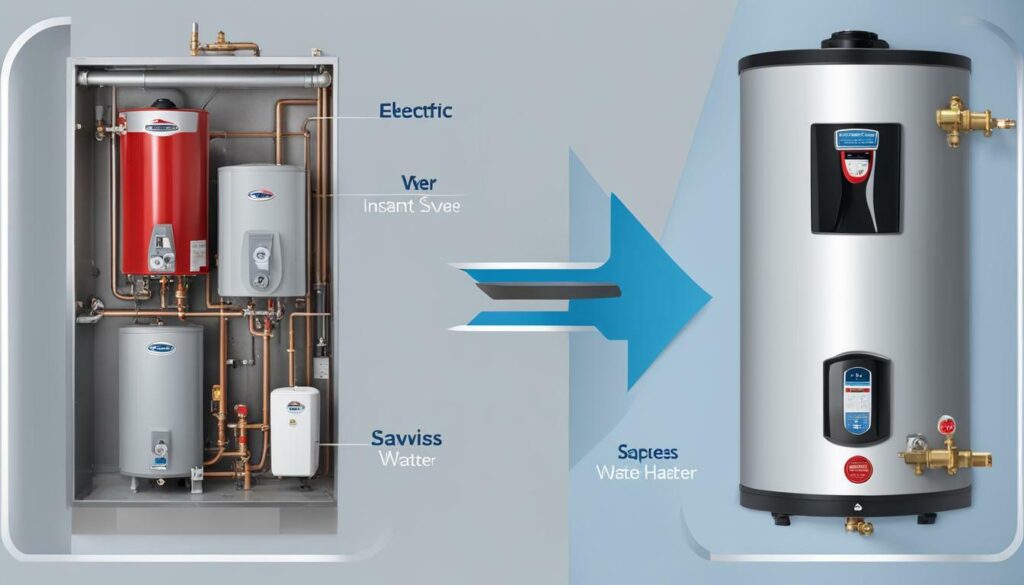
Electric tankless water heaters are a popular choice for homeowners looking to save money on their energy bills while reducing their carbon footprint. Compared to traditional tank-based systems, electric tankless water heaters can offer significant energy efficiency advantages.
One of the main reasons for the increased energy efficiency is that electric tankless water heaters only heat water as it is needed, eliminating the need to continuously heat and store water in a large tank. This can result in up to 30% energy savings, according to the U.S. Department of Energy.
Additionally, because electric tankless water heaters do not have a storage tank, they avoid the standby heat loss that occurs when hot water sits unused in a tank-based system. Standby heat loss accounts for a significant portion of a traditional water heater’s energy consumption.
Another advantage of electric tankless water heaters is their longer lifespan. While traditional tank-based systems typically last between 10-15 years, electric tankless water heaters can last up to 20 years with proper maintenance.
However, it is important to note that the upfront cost of an electric tankless water heater can be significantly higher than a traditional system. This is because the appliance requires more sophisticated technology and installation, which can cost more initially.
Despite this, the long-term cost savings from reduced energy consumption and longer lifespan can outweigh the initial investment, making electric tankless water heaters a smart choice for homeowners looking for a more energy-efficient option.
If you’re looking to upgrade your water heating system, electric tankless water heaters offer several benefits. Here are some advantages to consider:
| Benefits | Explanation |
|---|---|
| Energy Efficiency | Electric tankless water heaters are highly energy-efficient, as they only heat water when it’s needed. This means you’re not wasting energy to keep a tank of water hot all day, even when you’re not using it. |
| Cost Savings | By using only the energy you need, electric tankless water heaters can help you save on your utility bills. They also have a longer lifespan than traditional tank-based heaters, which means you’ll need to replace them less often. |
| Unlimited Hot Water Supply | Unlike traditional water heaters, which can run out of hot water after prolonged use, electric tankless water heaters provide an endless supply of hot water. This makes them ideal for large households or those with high hot water demands. |
| Space-saving Design | Electric tankless water heaters are compact and take up less space than traditional tank-based heaters. This can be especially beneficial if you’re limited on space or looking to free up storage areas in your home. |
| Decreased Risk of Water Damage | Since electric tankless water heaters don’t store water, there’s no risk of leaks or flooding from a burst tank. This can give homeowners greater peace of mind and reduce the risk of costly water damage. |
However, it’s important to consider the potential drawbacks of electric tankless water heaters, which we’ll explore in the next section.
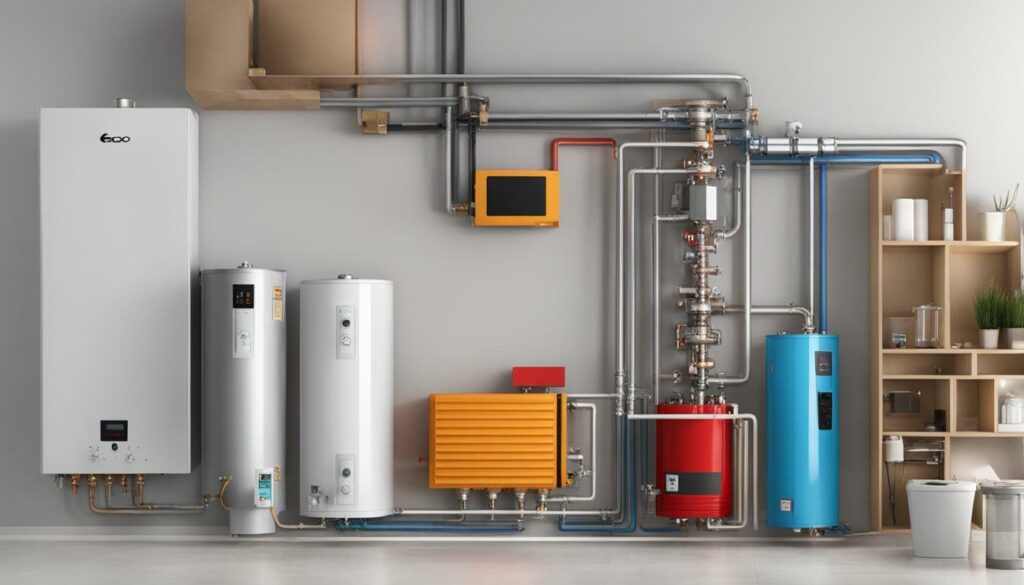
Choosing the Right Size and Capacity for Your Electric Tankless Water Heater
When selecting an electric tankless water heater, it’s essential to choose the right size and capacity to meet your household’s hot water demands effectively. A unit that is too small may not be able to provide enough hot water, while a unit that is too large may overheat the water and waste energy.
The size and capacity of an electric tankless water heater are measured in gallons per minute (GPM). It refers to the amount of hot water the unit can produce per minute. The GPM you require depends on the number of fixtures you want to supply hot water to simultaneously.
| Fixture | Typical GPM |
|---|---|
| Shower | 1.5-2.5 |
| Kitchen Sink | 1.0-2.5 |
| Dishwasher | 1.0-2.5 |
| Bathtub | 3.0-4.0 |
| Washing Machine | 2.5-3.0 |
As a general rule, a household of two people requires a minimum of 6 GPM, while a family of four requires a minimum of 8-10 GPM. However, these numbers can vary depending on your specific hot water needs.
Factors to consider when selecting the appropriate size and capacity for your electric tankless water heater include the number of people in your household, the number of fixtures you want to supply hot water to simultaneously, and the temperature of the incoming water. For homes located in colder regions, a higher GPM may be necessary to compensate for the lower incoming water temperature.
Overall, choosing the right size and capacity for your electric tankless water heater is crucial to ensure efficient operation and meet your household’s hot water demands.
Electric tankless water heaters are not just energy-efficient, but they are also eco-friendly, making them a popular choice among environmentally conscious homeowners. The primary environmental benefits of these appliances include:
- Reduced carbon emissions: Electric tankless water heaters are more energy-efficient than traditional tank-based systems, resulting in lower carbon emissions and a smaller carbon footprint. This reduction in emissions can help mitigate the impact of climate change caused by greenhouse gases.
- Conservation of water resources: Tankless water heaters provide hot water on-demand, eliminating the need for large storage tanks that constantly consume energy to maintain hot water supply. This means less water is wasted, making it an eco-friendly option for those who value water conservation.
- Longer lifespan: With a longer lifespan compared to traditional tank-based systems, electric tankless water heaters contribute less to environmental waste and are a more sustainable option in the long run.
Overall, electric tankless water heaters offer significant environmental benefits that make them an appealing option for homeowners looking to reduce their carbon footprint and make their homes more energy-efficient.
Comparing Electric Tankless Water Heaters with Other Water Heating Options
When considering upgrading your water heating system, it’s essential to understand the advantages and disadvantages of various options available in the market. Here, we will compare electric tankless water heaters with other popular water heating options to help you make an informed decision.
Electric Tank-Based Water Heaters
Electric tank-based water heaters are the traditional option found in most homes. They store hot water in a tank and heat it as needed. The main advantage of this system is that it can supply hot water to multiple outlets simultaneously, making it a suitable option for larger homes with higher hot water demands. However, they take up a lot of space and are less energy-efficient than electric tankless water heaters. Additionally, they require regular maintenance to prevent rust and sediment buildup.
Solar Water Heaters
Solar water heaters use energy from the sun to heat up water. They are eco-friendly and can lead to significant cost savings in the long run. However, they may not be suitable for homes in areas with minimal sunlight, and their upfront costs can be significant. Moreover, they require additional space for installation, which may not be feasible for some homes.
Gas Tankless Water Heaters
Gas tankless water heaters operate similarly to electric tankless water heaters but use natural gas instead of electricity. They offer a faster flow rate and are more energy-efficient than gas tank-based systems. However, they require regular maintenance and may not be suitable for homes without access to natural gas. Additionally, they may produce greenhouse gases during operation, which can harm the environment.
When comparing electric tankless water heaters with other water heating options, it’s essential to consider your home’s hot water demands, energy efficiency needs, and overall budget. Electric tankless water heaters offer numerous advantages, such as energy efficiency, cost savings, and unlimited hot water supply. However, they may not be suitable for large households with high hot water demands, have upfront costs, and have potential flow rate limitations. By weighing the pros and cons, you can make an informed decision about the best option for your home’s hot water needs.
Conclusion
Electric tankless water heaters have become increasingly popular due to their energy efficiency and cost savings. While they offer several benefits, including unlimited hot water supply and reduced carbon emissions, they also have potential limitations, such as upfront costs and flow rate limitations.
It’s essential to weigh the pros and cons before deciding whether an electric tankless water heater is the right choice for your home. Consider factors such as your household’s hot water needs, available space for installation, and budget.
Final Thoughts
Overall, electric tankless water heaters have many advantages and disadvantages. They suit those looking for a more eco-friendly and cost-effective water-heating option. However, they may not be suitable for every household. Researching and consulting with qualified professionals is crucial to determine whether this is the right option for your home.
By taking the time to understand the benefits and drawbacks of electric tankless water heaters, you can make an informed decision about the best water heating option for your household’s needs.



